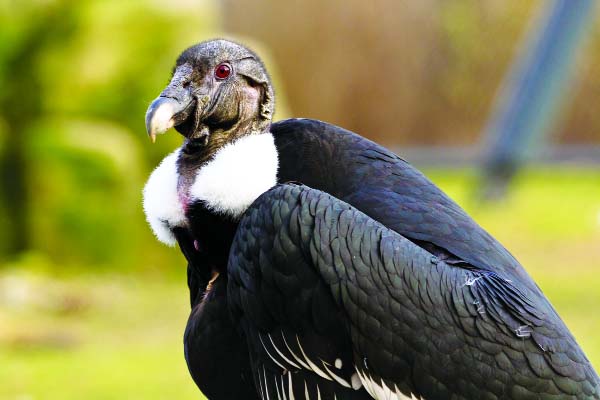
UNB, Dhaka :
Environment experts here on Sunday urged the authorities concerned to take coordinated steps to save white-rumped vultures to stop the spread of diseases as well as ensure environmental balance.
“Vulture is a natural cleaner. It is only this bird which can digest all kinds of germs …no other bird or animal can do so. If vulture disappears from environment, many diseases will break out epidemically,” Bangladesh Bird Club president Enamul Haque told a discussion in the capital.
He said, if the vulture goes extinct, rabies will be epidemic in society while the government has to spend huge money on killing dogs each year, aiming to check the diseases.
Bangladesh Forest Department and IUCN Bangladesh jointly organised the discussion at the Jatiya Press Club on
Sunday morning, marking the International Vulture Awareness Day 2015.
Bangladesh has records of seven species of vultures. Of these seven species, white-rumped vulture (Gyps bengalensis) and Slender-billed Vulture are found in Bangladesh. The white-rumped vulture was once widely seen in Bangladesh but now its population came down below 500.
Speaking on the occasion, IUCN country representative Ishtiaq Uddin Ahmad said even if the germs of anthrax are buried they may remerge as it has the capacity to survive, posing a serious threat to health. “Only vulture can digest the germs of anthrax…if the vulture goes extinct, human health will be at risk,” he added.
Over the last decade, it is scientifically proven beyond doubt that the use of diclofenac, a non-steroidal anti-inflammatory drug, in animals, especially in cattle, has led to massive mortality and a sharp decline in vulture population. The mechanism which causes the death is renal failure, a known side effect of diclofenac, according to experts.
If a coordinated effort is taken involving all stakeholders, Ishtiaq Uddin said, there is a possibility to protect the natural cleaners. Vultures eat the carcasses of livestock that have been administered veterinary diclofenac, and are poisoned by the accumulated chemical, as vultures do not have a particular enzyme in their bodies to break down diclofenac.
The experts observed that the loss of habitat and reduction in food availability have also been attributed for decline in population. Now, it is critically endangered and facing high risk of extinction due to rapid population decline. Saving Asia’s critically endangered vultures from extinction, IUCN Bangladesh in close collaboration with Bangladesh Forest Department has taken an initiative on white-rumped vulture conservation in Bangladesh. The work formally began in March 2014 and is for two years.
Environment experts here on Sunday urged the authorities concerned to take coordinated steps to save white-rumped vultures to stop the spread of diseases as well as ensure environmental balance.
“Vulture is a natural cleaner. It is only this bird which can digest all kinds of germs …no other bird or animal can do so. If vulture disappears from environment, many diseases will break out epidemically,” Bangladesh Bird Club president Enamul Haque told a discussion in the capital.
He said, if the vulture goes extinct, rabies will be epidemic in society while the government has to spend huge money on killing dogs each year, aiming to check the diseases.
Bangladesh Forest Department and IUCN Bangladesh jointly organised the discussion at the Jatiya Press Club on
Sunday morning, marking the International Vulture Awareness Day 2015.
Bangladesh has records of seven species of vultures. Of these seven species, white-rumped vulture (Gyps bengalensis) and Slender-billed Vulture are found in Bangladesh. The white-rumped vulture was once widely seen in Bangladesh but now its population came down below 500.
Speaking on the occasion, IUCN country representative Ishtiaq Uddin Ahmad said even if the germs of anthrax are buried they may remerge as it has the capacity to survive, posing a serious threat to health. “Only vulture can digest the germs of anthrax…if the vulture goes extinct, human health will be at risk,” he added.
Over the last decade, it is scientifically proven beyond doubt that the use of diclofenac, a non-steroidal anti-inflammatory drug, in animals, especially in cattle, has led to massive mortality and a sharp decline in vulture population. The mechanism which causes the death is renal failure, a known side effect of diclofenac, according to experts.
If a coordinated effort is taken involving all stakeholders, Ishtiaq Uddin said, there is a possibility to protect the natural cleaners. Vultures eat the carcasses of livestock that have been administered veterinary diclofenac, and are poisoned by the accumulated chemical, as vultures do not have a particular enzyme in their bodies to break down diclofenac.
The experts observed that the loss of habitat and reduction in food availability have also been attributed for decline in population. Now, it is critically endangered and facing high risk of extinction due to rapid population decline. Saving Asia’s critically endangered vultures from extinction, IUCN Bangladesh in close collaboration with Bangladesh Forest Department has taken an initiative on white-rumped vulture conservation in Bangladesh. The work formally began in March 2014 and is for two years.

